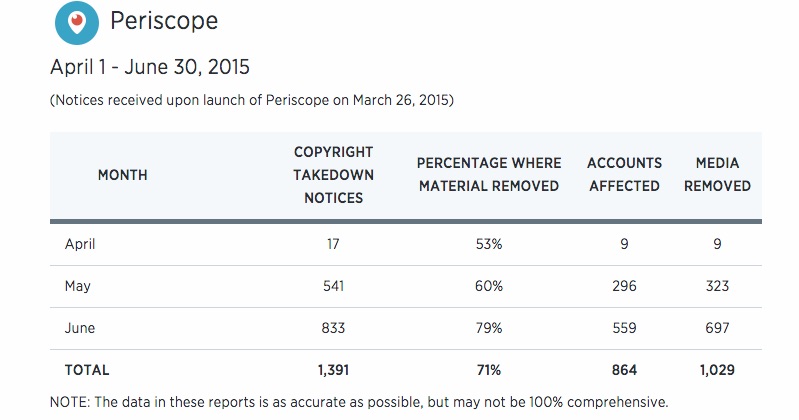
Periscope’s live streaming capability is increasingly becoming a bigger magnet for copyright takedown requests.
In a newly released Transparency Report, its owner Twitter says it has received 1,391 notices under the Digital Millennium Copyright Act for illegal streams on Periscope.
Since its launch in late March, the number of requests has increased dramatically from fewer than 20 in April to nearly 1,000 in June. Periscope has complied with 71 percent of requests, affecting 864 accounts and removing 1,029 streams.
Twitter released a month-by-month breakdown of the data:

Periscope’s live-streaming abilities has companies worried that users could illegally watch events without them paying for it, such as the case with the boxing match between Floyd Mayweather and Manny Pacquiao in May. Users discovered streams of the fight as a way to bypass to pricey pay-per-view fight that cable operators were charging.
The popularity even prompted former Twitter CEO Dick Costolo to post this eyebrow-raising tweet:
And the winner is… @periscopeco
— dick costolo (@dickc) May 3, 2015
When it first launched, HBO slammed Periscope as a possible app that promotes “mass copyright infringement” because people were using it to stream the premiere of ‘Game of Thrones.’
Compared to Twitter and Vine, Periscope has the highest compliance rate, writes VentureBeat, although that data is measured from January to June. Vine has received 2,405 notices with a 68 percent compliance rate and Twitter has garnered 14,694 takedown requests with a 67 percent compliance rate.
We’ve reached out to see how Periscope’s number compares to Meerkat, but have not yet heard back.
More in Media

In Graphic Detail: The scale of the challenge facing publishers, politicians eager to damage Google’s adland dominance
Last year was a blowout ad revenue year for Google, despite challenges from several quarters.

Why Walmart is basically a tech company now
The retail giant joined the Nasdaq exchange, also home to technology companies like Amazon, in December.

The Athletic invests in live blogs, video to insulate sports coverage from AI scraping
As the Super Bowl and Winter Olympics collide, The Athletic is leaning into live blogs and video to keeps fans locked in, and AI bots at bay.






